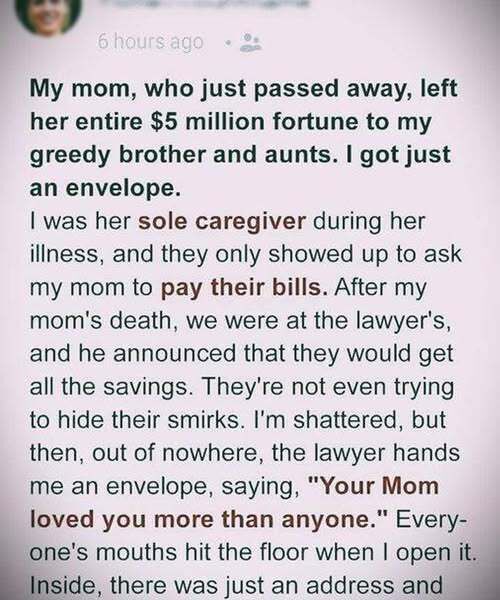After my mother passed away, I anticipated sorrow, a quiet grief that would settle into the corners of my life. I expected tears, long nights of sleepless reflection, and the soft, hollow ache of absence. What I did not expect was the sense of mystery that would follow her death, a puzzle she left behind, intricate and deliberate, like the last piece of a story only she understood.
I had spent years devoted to caring for her, attending to her needs with unwavering attention. I bathed her when she was too weak, cooked meals she barely touched, and sat beside her for hours during long hospital stays, holding her hand when the nights were dark and the pain too much to bear. I believed, perhaps naively, that such dedication would be acknowledged in her will. That I would inherit not just her love but a tangible token of her gratitude, a mark of recognition for the sacrifices I had made.
But life has a way of teaching lessons we are not always ready for. While my brother and my aunts inherited millions—sumptuous properties, vast investments, luxurious accounts—my portion seemed almost invisible at first glance. It came in the form of a simple cream-colored envelope, unadorned except for my name elegantly scrawled on the front in my mother’s delicate hand. Inside, there was a single key, small and weighty, with intricate engravings along its handle, and a folded piece of paper with an address written in the same careful script. There was no willful explanation, no note of guidance, just the bare essentials.
Curiosity stirred in me. Questions raced through my mind. What could this key open? What secret corner of the world had she hidden from me? Why had she bypassed me in the financial inheritance yet left this mysterious clue? My heart thumped with anticipation and dread, a mixture of fear and hope that only a daughter could feel when faced with her mother’s final enigma.
I followed the address she had provided. The directions led me out of the familiar streets of my childhood, beyond the neighborhoods that held both laughter and arguments, and into a secluded part of the countryside. Eventually, I came upon a stone cottage, its walls draped with ivy, the air heavy with the scent of blooming lavender. It was a place that seemed timeless, as if it had been waiting for me for decades, its windows dark, inviting, yet enigmatic.
I inserted the key into the old brass lock and turned it with trembling hands. The door creaked open, revealing a cozy interior filled with the warm, earthy scent of old wood and fresh flowers. Sunlight streamed in through small, diamond-shaped windows, illuminating the gentle dust motes that danced lazily in the air. In the center of the room sat a small table, and atop it lay a single letter resting beside a pot of blooming violets, their purple petals radiant against the plain wooden surface.
With a mixture of reverence and curiosity, I picked up the letter. My mother’s handwriting—so familiar, so intimate—leapt off the page. Each loop and flourish carried the cadence of her voice, as if she were speaking to me directly from beyond the veil. In the letter, she expressed her gratitude, not for the money I had never received, but for my years of compassion, my patience, my unwavering presence. She acknowledged the quiet sacrifices I had made, the small, unnoticed acts of love that had filled her final years with comfort and dignity.
Her words explained that while the monetary inheritance went to others, this small, hidden fortune was meant for me—a treasure not measured in coins or banknotes, but in memories, wisdom, and connection. She wrote that the cottage itself, along with its lush garden and the seeds she had planted over the years, belonged to me now. It was a sanctuary, a space where I could reflect, heal, and carry forward the legacy of care she had nurtured in me.
As I read, tears blurred the edges of the paper. The violets seemed to nod in quiet approval, their fragrance mingling with the lavender drifting through the open windows. I understood then that the real fortune was not the key, the letter, or even the cottage—it was the validation of my devotion, the recognition that love and kindness, though intangible, could leave a legacy as enduring as any sum of money.
I spent hours wandering through the cottage and garden, touching the rough stone walls, inhaling the aroma of herbs and blossoms, and imagining my mother tending each plant, each corner, with care and intention. Every detail felt infused with her presence. I realized that she had gifted me not just a home, but a reminder that the greatest treasures are often invisible to the eye, yet felt deeply in the heart.
That day, I understood something fundamental: inheritance is not always about wealth or material possessions. Sometimes, the most profound gifts are the ones that cannot be counted or measured—gifts of love, of guidance, of memory. And in that quiet stone cottage, amidst the violets and the lavender, I found a fortune I had never expected but had always deserved.
My mother had left me something eternal: a space to remember her, a place to nurture myself, and a tangible connection to the love that had shaped me into the person I had become.
And for the first time since her passing, I smiled through my tears, feeling a completeness I had never imagined possible, knowing that even in death, her thoughtfulness had reached me, her daughter, in a way that no money ever could.
